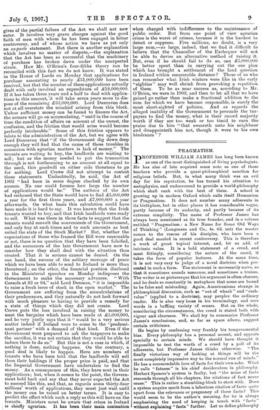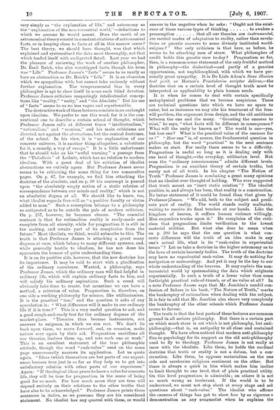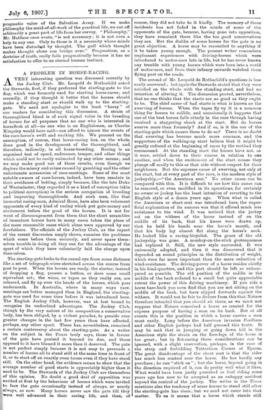PRAGMATISM.
PROFESSOR WILLIAM JAMES has long been known as one of the most distinguished of living psychologists. He has also of late acquired some note as one of those teachers who provide a quasi-philosophical sanction for religious beliefs. But, in what many think was an evil day for his reputation, he has turned his attention to metaphysics, and endeavoured to provide a world-philosophy which shall rank with the best of them. A school is growing up in modern Oxford which calls itself Humanism or Pragmatism. It does not number many adherents in its birthplace, but in other places it has considerable vogue, partly because of its audacity, and partly because of its extreme simplicity. The name of Professor James has always been mentioned as its true founder, and in a volume entitled " Pragmatism : a New Name for Some Old Ways of Thinking" (Longmans and Co., 4s. 6d. net) the master comes to the rescue of his disciples, who have been a good deal mauled in recent controversy. This is therefore a work of great topical interest, and, let us add, of intrinsic value. It is a bold statement of a creed, and most fittingly, considering the nature of the creed, it takes the form of popular lectures. At the same time, it is not very easy to judge of, a novel doctrine when pre- sented in such a form. The statement is necessarily naive, so that it sometimes sounds nonsense, and sometimes a truism. The writer is so picturesque that his argument is often obscure, and he deals so constantly in metaphors that some are bound to be false and misleading. Again, Americanisms strange in philosophical discussion, such as "out of whack" and "cash- value" (applied to a doctrine), may perplex the ordinary reader. He is also very loose in his terminology, and uses words in a baffling variety of senses. But on the whole, considering the circumstances, the creed is stated both with vigour and clearness. We shall try to summarise Professor James's conclusions, and, so far as space allows, suggest certain criticisms.
He begins by confessing very frankly his temperamental bias. Every philosophy has a personal accent, and appeals specially to certain minds. We should have thought it impossible to test the worth of a creed by a poll of its adherents, but Professor James thinks otherwise. "The finally victorious way of looking at things will be the most completely impressive way to the normal run of minds." He has a commendable love of facts for their own sake. What he calls " fatness " is his chief desideratum in philosophy. Herbert Spencer's system is faulty, but "the noise of facts resounds through all his chapters, the citations of fact never cease." This is rather a stumbling-block to start with. Does a system acquire merit from a laborious citation of facts quite apart from the relevance or pregnancy of these facts ? This would seem to be the author's meaning, for he is always emphasising the need of keeping in touch with " facts " without explaining " facts " further. Let us define philosophy very simply as the explanation of life," and astronomy as the "explanation of the non-terrestrial world,--definitions to which we assume he would assent. Does the merit of an astronomical theory consist in constant citations of astronomical facts, or in keeping close to facts at all in this narrow sense ? The best theory, we should have thought, was that which explained and systematised the data most thoroughly, not that which loaded itself with undigested detail. Last year we had the pleasure of reviewing the work of another philosopher, Dr. Emil Reich, who also worshipped facts, though his term was "Life." Professor James's " facts " seems to us nearly as bare an abstraction as Dr. Reich's "Life." It is an obsession which we sympathise with, but cannot take seriously without further explanation. The temperamental bias in every philosopher is apt to show itself in some such blind devotion. Professor James criticises unsparingly intellectualist concep- tions like "reality," " unity," and "the Absolute." But his use of " facts " seems to us no less vague and reprehensible.
The destructive work of these lectures consists in an onslaught upon idealism. We prefer to use this word, for it is the con- ventional one to describe a certain school of thought, which Professor James calls at different times "intellectualism," "rationalism," and "monism," and his main criticisms are directed, not against the aberrations, but the central doctrines, of the school. In his view, it is "no explanation of our concrete universe, it is another thing altogether, a substitute for it, a remedy, a way of escape." It is a little unfortunate that he should take as his "awful warning" a .passage from the "Theodicee " of Leibniz, which has no relation to modern idealism. With a great deal of his criticism of idealist abstractions we entirely agree. But Professor James never seems to be criticising the same thing for two consecutive pages. On p. 67, for example, we find him attacking the doctrine of the absolute, and on p. 69 his contempt is poured upon "the absolutely empty notion of a static relation of correspondence between our minds and reality," which is not an absolutist dogma at all. We should like to know, too, what idealist regards free-will as "a positive faculty or virtue added to man." Such a conception belongs to a philosophy so antiquated as to be outside the pale of modern criticism. On p. 257, however, he becomes clearer. "The essential contrast is that for rationalism reality is ready-made and complete from all eternity, while for pragmatism it is still in the making, and awaits part of its complexion from the future." Most idealists, we think, would subscribe to this. The truth is that Professor James is attacking a great many dogmas at once, which belong to many different systems, and, while generally hostile to idealism, he has not done his opponents the honour of quite understanding them.
It is on its positive side, however, that the new doctrine has its importance. It may be said to start with a glorification of the ordinary conscience. Wanted, a philosophy, says Professor James, which the ordinary man will find helpful in ordinary life, which will explain ordinary facts to him, and will satisfy his ordinary aspirations. Such a creed will obviously take time to create, but meantime we can have a method, a criterion of value. Pragmatism is, therefore, on one side a working philosophy for science, like utilitarianism. It is the practical "ism," and the question it asks of any speculation is : "What difference will it make to our ordinary life if it is true ? " This is a very useful question to ask, and a good rough-and-ready test for the ordinary dogmas of the market-place. "Theories thus become instruments, not answers to enigmas, in which we can rest. We don't lie back upon them, we move forward, and, on occasion, make nature over again by their aid. Pragmatism unstiffens all our theories, limbers them up, and sets each one at work." This is an excellent statement of the true philosophic attitude, though the word "cash-value" used on the same page unnecessarily narrows its application. Let us quote again. "Ideas (which themselves are but parts of our experi- ence) become true just in so far as they help us to get into satisfactory relation with other parts of our experience." Again : "If theological ideas prove to have a value for concrete life, they will be true for pragmatism in the sense of being good for so much. For bow much more they are true will depend entirely on their relations to the other truths that have also to be acknowledged." Professor James prints these sentences in italics, so we presume they are his considered statement. No idealist has any quarrel with them, or would answer in the negative when he asks : "Ought not the exist- ence of these various types of thinking to awaken a
presumption that all our theories are instrumental, are mental modes of adaptation to reality, rather than revela- tions or gnostic answers to some divinely instituted world- enigma ? " Our only criticism is that here, as before, he seems to be attacking men of straw. What philosopher of credit holds this gnostic view to-day ? Pragmatism so far, then, is a common-sense statement of the only fruitful method in philosophy—the dialectical—and partly of a genuine opportunism, not unphilosophical, with which we have per- sonally great sympathy. It is De Lisle Adam's Sans illusion tout pent, or Horace's Praetulerim seriptor delirus,—the doctrine that on a certain level of thought truth must be interpreted as applicability to plain human needs.
It is when he comes to deal with certain specifically metaphysical problems that we become suspicious. These are technical questions into which we have no space to enter, but as instances we may cite his treatment of the free- will problem, the argument from design, and the old antithesis between the one and the many. "Granting the oneness to exist," he says, "what facts will be different in consequence ? What will the unity be known as ? The world is one—yes, but how one ? What is the practical value of the oneness for us " "How one" is, of course, the fundamental question in philosophy, but the word " practical " in the next sentence makes us start. For really there seems to be a difficulty. Pragmatism is useful as long as it is dealing only with one level of thought,—the everyday, utilitarian level. But even the "ordinary consciousness" admits different levels. Pragmatism is an excellent theory of certain truths, but surely not of all truth. In his chapter "The Notion of Truth" Professor James is combating a great many opinions that no idealist ever thought of holding. Who ever suggested that truth meant an "inert static relation " ? The idealist position is, and alWays has been, that reality is a construction. No better statement of it could be found than that given by Professor !James. "We add, both to the subject and predi- cate part of reality. The world stands really malleable, waiting to receive its final touches at our hands. Like the kingdom of heaven, it suffers human violence willingly. Man engenders truths upon it." He complains of the criti- cism that pragmatism limits verification to the lowest material utilities. But what else does he mean when on p. 200 he says that the one question is what con- crete difference will the truth of an idea make in any one's actual life, what is its "cash-value in experiential terms " ? Let us take a doctrine in the higher astronomy as to the laws of certain heavenly bodies. The truth of the doctrine may have no experiential cash-value. It may do nothing for navigation or meteorology. And yet it may be the key to our whole understanding of the heavens. It may explain the non- terrestrial world by systematising the data which originate experientially. Is such a truth of a lower value than some forthright practical rule-of-thumb, or of no value at all ? In a note Professor James says that Mr. Joachim's candid con- fession of failure in his book, "The Nature of Truth," marks the bankruptcy of rationalism when dealing with the subject. It is fair to add that Mr. Joachim also shows very completely the bankruptcy of the other schools which Professor James seems to favour.
The truth is that the best parts of these lectures are common ground in all serious philosophy. But there is a certain part on which much store is set which is not philosophy, but anti- philosophy,—that is, an antipathy to all close and sustained thought. We have often noticed that modern anti-philosophy flies to psychology for its support as the old anti-philosophy used to fly to theology. Professor James is not really at issue with the idealists. Like them, he holds the cardinal doctrine that truth or reality is not a datum, but a con- struction. Like them, he opposes materialism on the one side and saccharine religious sentiment on the other. But there is always a quirk in him which makes him incline to limit thought to one level, that of plain practical utility. On this level pragmatism is admirable ; on others it is not so much wrong as irrelevant. If the world is to be understood, we must not stop short at every stage and ask questions about "cash-value." The idealist who affirms the oneness of things has got to show how by as rigorous a demonstration as any pragmatist when he explains the
pragmatic value of the Salvation Army. If we make philosophy the maid-of-all-work of the practical life, we cut off arbitrarily a great part of life from her survey. "Philosophy," Mr. Haldane once wrote, "is not necessary ; it is not even a help to any one. Only to those is it a necessity whose minds have been disturbod by thought. The gulf which thought makes thought alone can bridge over." Pragmatism, as a doctrine of truth, really fails pragmatically because it has no satisfaction to offer to an eternal human instinct.
















































 Previous page
Previous page